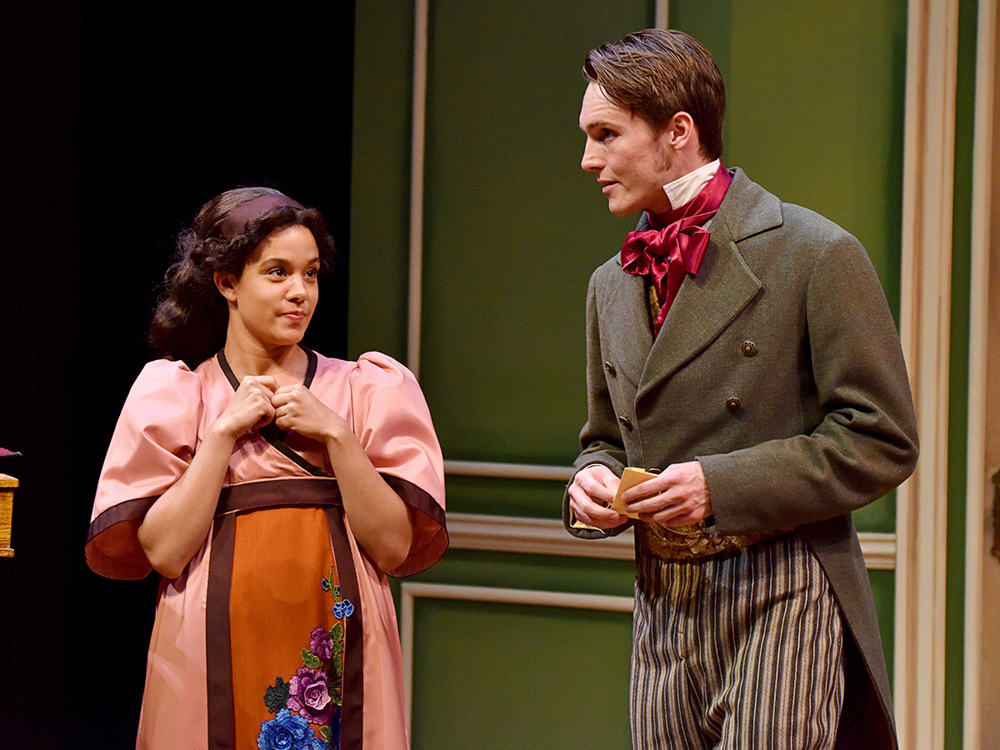PCPA Presents ‘Arcadia’
Tom Stoppard’s Magnum Opus Comes to Solvang

It’s been a quarter century since the debut of Tom Stoppard’s Arcadia, and the play’s extraordinarily rich blend of history, literature, and science has only become more relevant with time. Seeking a way to express ideas from physics and mathematics about chaos and entropy, the playwright created a double portrait of the inhabitants of an English country estate. In alternating scenes, Arcadia explores the Coverly family’s Sidley Park as it was in 1809 and again as it is in 1993, until, in a bravura final sequence, the two time frames blend into one.
Arcadia is among the most admired and challenging plays of the 20th century, and this is the second time that PCPA director Roger DeLaurier has directed it. His first production in 1999 was also for PCPA, and it never left the intimate confines of the Severson Theatre in Santa Maria. This time around, the show has been created with the Solvang Festival Theater’s large outdoor space in mind from the beginning, and DeLaurier is excited about what that means, saying, “The architecture of the space is a big feature to help us understand who the Coverlys are in both modern time and in the past.” One key subplot of the 1809 setting involves discussions between Lady Croom (Polly Firestone Walker) and Richard Noakes (Paul Henry) about what to do with the estate’s gardens. Noakes, a character based on the great 18th-19th-century landscape architect Capability Brown, advocates for a classical sense of order, while Lady Croom flirts with then-trendy Gothic and Romantic options.
Clever yet idea-laden dialogue among characters derived from history is of course what Tom Stoppard is famous for, and in Arcadia he operates at peak form. The most ingenious of the play’s historical reimaginings involves Thomasina Coverly (Grace Theobald), a 13-year-old girl living in the house in 1809. In a plot twist based on the real-life story of Ada Lovelace, the daughter of the poet Lord Byron, Thomasina discovers an important mathematical principle but can’t prove it because the computers that will be needed to do the calculations for the proof have yet to be invented. Lovelace, working in circumstances somewhat comparable to those depicted in the play, although at a later time, did in fact theorize the mathematical principles that would lead Charles Babbage to create the Analytical Engine, an early precursor to the modern binary computer. In the play, Thomasina’s speculations about entropy and the possible end of the universe allude to darker aspects in the poetry of Lord Byron, the most famous Englishman of the 19th century.
But don’t let the density of its erudite references put you off attending this wonderfully entertaining show. It’s full of zingy one-liners straight out of the Bernard Shaw/Oscar Wilde tradition, the sinuous plot creates genuine suspense, and there’s plenty of unresolved sexual tension among the various figures in both time frames. It’s often said that Arcadia is the best play written so far about science, and that is of course high praise, but it’s also only half of the story. What makes the talk about science — and landscape architecture, and poetry, and history — in this play special is the way that each character so clearly seeks to either impose certain priorities on the world or to derive them from observing it. The “Arcadia” of the title reflects not only the abundance and beauty of the natural world but also the unending idealism with which humans seek to alter it.
Whether aiming to shape the earth’s gardens after new patterns or seeking to discern patterns in the seeming chaos of apparent wilderness, Stoppard’s characters yearn for a deep connection to nature. To live well as humans within the limits of nature remains a challenge today, and with Arcadia, PCPA invites its audience to meet it.
4·1·1
Arcadia runs until August 25 at the Marian Theatre (870 S. Bradley Rd., Santa Maria) and August 30-September 9 at the Solvang Festival Theater (420 2nd St., Solvang). For tickets and information, see pcpa.org or call 922-8313.



